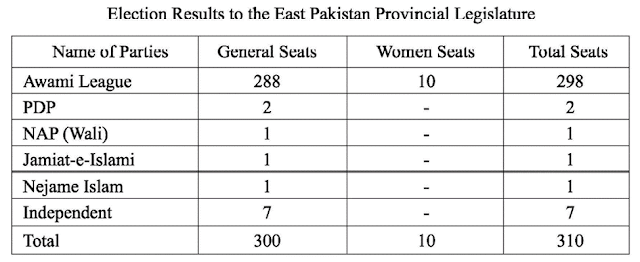1970 general election was the first in Pakistan state. The Election was held on the basis of adult and universal franchise. This election was held in two rounds: first on December 7 in 1970 and then on 17 January in 1971. The political parties which took part in that election were: Awami League, Pakistan People's Party (PPP), National Awami Party- NAP (Wali Khan), different groups of Muslim League, Jammat-e-Islami,Jamiate Ulama-e-Islam, J amiate Ulama-e-Pakistan, Nizam-e-Islam, Pakistan Democratic Party (PDP) etc. Of these parties, two main parties were Awami League under the leadership of Bangabandhu, and Pakistan People's Party under the leadership of Julfikar Ali Bhutto.
The main issue of Awami League's election manifesto was its
6-point program. The slogans of Pakistan People's Party were: 'Islam is our
belief, democracy is our state system and socialism is our economy'. The themes
of the People's Party's publicity were: 'strong centre', 'Islamic socialism'
and continued opposition to India. On the other hand, Muslim League and other
Islamic parties like PPP highlighted Islamic constitution, strong centre and
opposition to India.
Election Results
The results of 1970 general elections are presented in the
tables below.
Election Results to the East Pakistan Provincial Legislature
The general election of 1970 was held in a fair, peaceful and
disciplined environment. In the result of the election, Awami League won 160
out of 162 regional seats of the national assembly. Along with the 7 reserved
seats for women, Awami League won a total 167 seats out of 313. In the
provincial assembly of East Pakistan, Awami League won 288 regional seats out
of 300.In the rest of the 12 seats, independent candidates won 9, Pakistan
Democratic Party won 2 and Jamat-E- Islami won 1 seat. Including the 10
reserved seats for women, Awami League won 298 seats in the provincial
assembly.
On the other hand, Julfiquar Ali Bhutto's Pakistan People's
Party won 83 out of the allotted 138 seats. Muslim League (Kaium Khan) won 9,
Muslim League (council) won 7, Jamiat-e- Ulama-e Islam won 7, National Awami
Party-NAP (Wali Khan) won 6, Jamaiat-e-Ulama-e Pakistan won 7, Jamat-E-Islami
won 4, Muslim League (Convention) won 2 and non-party candidates won 13 out of
the remaining 55 seats.
In the reserved 6 seats for women in West Pakistan PPP won 5 and
NAP (Wali Khan) won the remaining one, including the reserved seats for women
PPP won a total of 88 seats.
As Awami League won the absolute majority in 1970 general
elections, it made the Pakistani ruling elites apprehensive about losing power. Through
the winning of AL's absolute majority in the elections, Bangali got the rights
to attaining the state authority and the assurance of drafting constitution
based on 6-points. Both were unacceptable to the Pakistani ruling elites. As a
result, right after the publication of the election results, palace conspiracy
began. Julfiqar Ali Bhutto, the leader of Pakistan People's Party got actively
implicated in the conspiracy being orchestrated by civil-military bureaucracy
elites.
Pakistani military janta continued to negotiate with the
majority party leader, Bangabandhu Sheikh Mujibur Rahman, while troops and
weapons were being brought in from West Pakistan. The Pakistani ruling elites
could not cordially accept the victory of AL. They became perturbed at Bangabandhu's
uncompromising stand about 6-points. So having made up their mind for a
military solution to the rising problem, they took time for preparation until
25 March 1971.
President Yahyia Khan called the National Assembly session on 3 March, 1971. After the elections, he had labeled Bangabandhu Sheikh Mujibur Rahman, the 'future Prime Minister' of Pakistan. But all this was an eye-wash. Inside, there was a strong conspiracy to nullify the verdict of the election.




Very helpful..
ردحذف